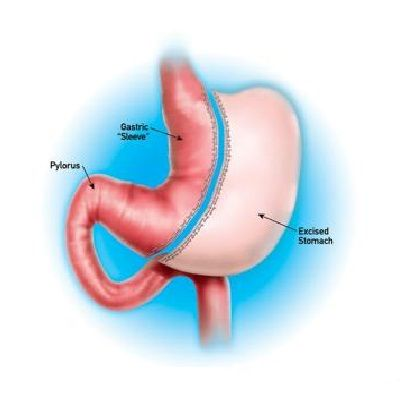
Gastric sleeve surgery, also known as sleeve gastrectomy, is a popular weight-loss surgery that has transformed the lives of many individuals struggling with obesity. This surgical procedure involves removing a large portion of the stomach, creating a tube-like structure or "sleeve" which restricts the amount of food the stomach can hold. By reducing the stomach's capacity, gastric sleeve in Dubai(تكميم المعدة في دبي) surgery leads to significant weight loss and can improve overall health. Understanding the details of this procedure is crucial for those considering it as a solution for long-term weight management.
What is Gastric Sleeve Surgery?
Gastric sleeve surgery is a type of bariatric surgery designed to help individuals achieve significant weight loss. The procedure involves removing approximately 80% of the stomach, leaving a smaller, banana-shaped "sleeve" that restricts food intake. This surgery is typically recommended for individuals with a BMI (Body Mass Index) of 40 or higher, or those with a BMI of 35 and above with related health conditions such as diabetes, high blood pressure, or sleep apnea. The smaller stomach size limits hunger and helps individuals feel full after eating smaller portions, leading to weight loss over time.
Benefits of Gastric Sleeve Surgery:
One of the most significant benefits of gastric sleeve surgery is the substantial weight loss that can occur within the first year following the procedure. Most individuals lose 50 to 70% of their excess weight, significantly improving their quality of life and reducing the risk of obesity-related diseases. Aside from the weight loss, gastric sleeve surgery has shown to improve conditions such as type 2 diabetes, hypertension, sleep apnea, and joint pain. Additionally, patients often report enhanced energy levels, improved mood, and a better overall sense of well-being.
The Procedure: How Gastric Sleeve is Done
The gastric sleeve surgery is performed under general anesthesia, and it typically takes about 60 to 90 minutes to complete. It is usually done laparoscopically, which means that the surgeon makes small incisions in the abdomen and inserts a tiny camera and surgical instruments to perform the surgery. This minimally invasive approach allows for faster recovery times and reduces the risk of complications. After the stomach is reduced to a sleeve, the incisions are closed with sutures, and the patient is monitored as they begin the recovery process.
Risks and Considerations:
While gastric sleeve surgery is considered safe for most patients, like any surgery, it does carry risks. Potential complications include infection, bleeding, blood clots, and leaks from the newly created sleeve. Long-term risks may involve nutritional deficiencies due to the reduced stomach capacity, which may require lifelong supplementation. Patients will need to follow a strict diet and exercise regimen post-surgery to ensure successful weight loss and maintain their health. It's important to carefully consider these factors and discuss them with a healthcare professional before making a decision.
Recovery and Post-Surgery Lifestyle Changes:
Recovery after gastric sleeve surgery typically takes a few weeks, during which time the patient must follow a special diet plan. Immediately after surgery, patients will be on a liquid-only diet, gradually progressing to pureed foods and soft foods. Solid foods can typically be reintroduced after six to eight weeks, but portion control is essential. Patients must eat slowly, chew food thoroughly, and avoid overeating to prevent discomfort or complications. Additionally, a commitment to physical activity and regular check-ups is essential for long-term success.
Diet and Nutrition After Gastric Sleeve:
Dietary changes are an essential part of the post-surgery lifestyle. Since the stomach capacity is drastically reduced, patients will need to adjust their eating habits to ensure they receive adequate nutrition while maintaining their weight loss. It's recommended to consume high-protein, low-calorie foods that are easy to digest. Smaller, frequent meals are necessary to avoid overloading the stomach. Drinking fluids is also important, but patients should avoid drinking large amounts of liquid during meals to avoid feeling too full
Patients may also need to take vitamin and mineral supplements, especially those that help prevent deficiencies in calcium, iron, and vitamin B12. Proper hydration and regular monitoring of nutrient levels can help maintain overall health and avoid deficiencies in the long term.
Long-Term Results and Success:
The success of gastric sleeve surgery depends on several factors, including adherence to post-operative guidelines, maintaining a healthy diet, and incorporating regular physical activity. For many patients, gastric sleeve surgery leads to long-term weight loss and improved health. However, it is important to recognize that the surgery is a tool, not a cure, and a lifelong commitment to a healthy lifestyle is necessary to maintain the results. Regular follow-ups with healthcare professionals can help ensure that any potential issues are addressed promptly.
Conclusion:
Gastric sleeve surgery offers a promising solution for individuals struggling with obesity and related health conditions. While it involves significant changes to one’s stomach and lifestyle, the benefits—such as sustained weight loss and improved health—can be life-changing. The procedure requires careful consideration and commitment, but with the right preparation and support, it can be an effective step towards a healthier future. Gastric sleeve surgery is not just about reducing the stomach size; it is about transforming one’s entire approach to eating, lifestyle, and health.













